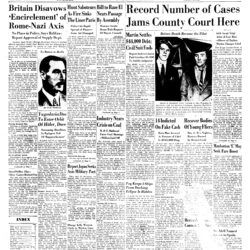
Teens Struggle To Find Elusive Part-Time Jobs
Teen From Brooklyn Tries To Help Her Mother Out
By Stephanie Reitz
Associated Press
HARTFORD, Conn. — The economic turmoil that has left many Americans without work is having a disproportionate effect on teenage job-seekers, whose quest for entry-level positions often pits them against experienced older workers willing to take any job for a paycheck.
U.S. labor figures show the 2011 unemployment rate nationwide averaged just below 9 percent, but for job-seekers ages 16 to 19, it was almost 25 percent — the third consecutive year in that range, and with some cities recording rates far higher.
Automation has also eliminated many of the after-school, weekend and summer jobs that had been the longtime domain of first-time workers as computerized equipment has helped companies trim positions in everything from local car washes to photocopy shops and supermarkets.
Participants discussing the trend at a forum Tuesday in Hartford say that it’s alarming, and that society suffers when an entire generation’s chance to learn valuable workplace skills are delayed or denied. On a personal level, it’s also a source of growing stress for teenagers who need jobs for experience, pocket money or to help their families.
Brooklyn-Born Teen Enters Paid Internship
“My mom doesn’t have a lot of money and what she does have, she spends on me and on my brother, so I really want to work and be able to help and take care of some things myself,” said Trisana Spence, 16, who moved last year from Brooklyn, N.Y., to Hartford and hopes someday to become a lawyer.
Spence, a junior at the Hartford Culinary Arts Academy high school, might end up with a slight advantage.
She’s in a paid internship through her school and the city’s Blue Hills Civic Association to learn job skills and will be placed at a yet-undetermined job this summer. She says she’ll work extra hard in hopes that the employer will keep her on board even after the summer so she can help pay for household expenses and some extras, such as her 4-year-old brother’s karate lessons.
Participants at Tuesday’s forum said that partnerships between government and civic groups, businesses, nonprofit agencies and other organizations may be a key factor to helping job-seeking teens, but that those groups face financial hurdles to keep internships and job-training programs going, too.
The White House and U.S. Department of Labor this month kicked off a campaign appealing to the private sector to create 250,000 more summer jobs in businesses, nonprofits and government agencies, with at least 100,000 of them being paid spots.
Sen. Richard Blumenthal, a Connecticut Democrat who attended Tuesday’s forum, said that initiative and others are critical to ensure teens get a chance to learn job skills and prepare for careers.
“The phenomenon of youth unemployment is sweeping the world, not just Connecticut,” said Blumenthal, who credits his first job as a camp counselor with introducing him to mentors and the sense of pride and responsibility that work can instill.
According to the U.S. Bureau of Labor Statistics, the 2011 nationwide unemployment rate of 24.4 percent for teen job-seekers from 16 to 19 years old was the second highest recorded since it started keeping the statistic in the late 1940s. The figures reflect teens actively seeking jobs and do not include those not applying for positions.
The 2010 figure was the highest at 25.9 percent, though it approached 20 percent in the mid-1970s and nudged slightly over that level in 1982 and 1983.
In recent decades, teens had the best luck getting jobs in the boom years around the turn of the millennium, when their unemployment rate was around 13 percent — and those workers, a large part of today’s adult workforce, have a track record of experience that often puts them ahead of today’s teens in the job hunt.
Nationwide and in cities like Hartford, there’s heavy competition for each available job.
Federal labor statistics show there’s an average of 4.2 people out of work for each job that’s open nationwide depending on industries and regions.
It’s no longer enough for teens to be willing to work for entry-level wages, since many displaced experienced workers are also willing to take lower pay for a chance at a regular income, some experts said Tuesday.
Nineteen-year-old Calvin Brown of Bristol sees that firsthand. When he was in high school, he felt fortunate to be able to get a few hours of work each week at a local convenience store — “Just about enough to pay for gas,” said Brown, now an unpaid intern for U.S. Rep. John Larson, D-Conn.
The experience is worth the financial trade-off for Brown, a political science major at Central Connecticut State University, but he said he still sees many of his friends struggle to find jobs.
“A lot of the time, it ends up being through connections: ‘Oh, I’m cleaning floors at my father’s shop,’ or something like that,” Brown said. “But a lot of the time, even in the most entry-level jobs, you’re competing against someone with a lot of experience.”
John Twomey, chief executive officer of the New York Association of Training and Employment Professionals Inc., said the teens’ observations are borne out in unemployment figures that show a wide gap between teens seeking jobs and those actually finding them.
“They’re not all in basketball camp or backpacking in Europe,” he said, jokingly, of those without jobs. “Kids want to work. We’re in danger of graduating a whole generation of kids who don’t know how to work.”
Leave a Comment
Leave a Comment


